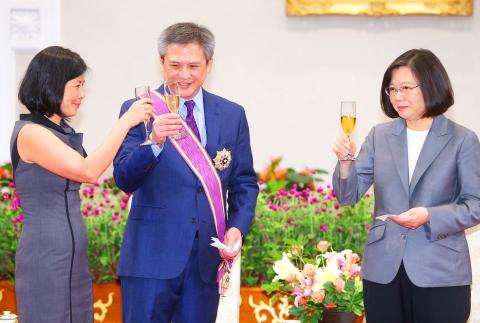President Tsai Ing-wen (蔡英文) yesterday conferred the Order of Brilliant Star on outgoing American Institute in Taiwan (AIT) Director Kin Moy as recognition of his contribution to Taiwan-US ties.
At a ceremony at the Presidential Office Building in Taipei, Tsai awarded Moy the second-highest level of the Order of Brilliant Star, which is given to civil servants, non-civil servants and foreign nationals for remarkable dedication.
Minister of Foreign Affairs Joseph Wu (吳釗燮) last month conferred on Moy the Grand Medal of Diplomacy, the highest honor Taiwan gives to an individual for diplomatic contributions.

Photo: CNA
Tsai said that when Moy took office three years ago, he set three goals: building trust with the Taiwanese government, showing Taiwanese that the US is Taiwan’s best friend and completing the construction of the AIT’s new compound in Taipei’s Neihu District (內湖).
“I believe Director Moy has achieved all three goals,” Tsai said.
During his tenure, Moy also proved himself to be the best friend of Taiwan, she said, citing the AIT head’s close interactions with local government officials and the trips he made to many parts of Taiwan, as well as the creative way in which he has engaged the public through Facebook.
“Director Moy is set to leave his post later this month, and I know his one regret is that he has not been able to visit Kinmen,” Tsai said. “I want to tell him that, other than Kinmen, there are many parts of Taiwan that look forward to him visiting again.”
“Taiwan will always be your second home,” she added.
In his speech, Moy attributed achievements in Taiwan-US relations over the past three years to the hard work of AIT staff, who he said were instrumental in helping him fulfill his vision for ties between Washington and Taipei.
Moy said AIT staff are the reason he is confident that the US’ partnership with Taiwan will continue to prosper long after his departure.
He then jokingly said that as he would soon be out of a job, he has talked to Tsai about pulling some strings to help him secure the position of National Taiwan University president.
The university’s presidency has been dogged by controversies for months due to the Ministry of Education’s refusal to confirm the school’s nomination of former National Development Council minister Kuan Chung-ming (管中閔) as its president, citing the university’s failure to avoid conflicts of interest in the election process.
Moy is to be succeeded by former AIT deputy director Brent Christensen this summer, but the AIT has yet to announce when Christensen is to take office.

A Ministry of Foreign Affairs official yesterday said that a delegation that visited China for an APEC meeting did not receive any kind of treatment that downgraded Taiwan’s sovereignty. Department of International Organizations Director-General Jonathan Sun (孫儉元) said that he and a group of ministry officials visited Shenzhen, China, to attend the APEC Informal Senior Officials’ Meeting last month. The trip went “smoothly and safely” for all Taiwanese delegates, as the Chinese side arranged the trip in accordance with long-standing practices, Sun said at the ministry’s weekly briefing. The Taiwanese group did not encounter any political suppression, he said. Sun made the remarks when

The Taiwanese passport ranked 33rd in a global listing of passports by convenience this month, rising three places from last month’s ranking, but matching its position in January last year. The Henley Passport Index, an international ranking of passports by the number of designations its holder can travel to without a visa, showed that the Taiwan passport enables holders to travel to 139 countries and territories without a visa. Singapore’s passport was ranked the most powerful with visa-free access to 192 destinations out of 227, according to the index published on Tuesday by UK-based migration investment consultancy firm Henley and Partners. Japan’s and

BROAD AGREEMENT: The two are nearing a trade deal to reduce Taiwan’s tariff to 15% and a commitment for TSMC to build five more fabs, a ‘New York Times’ report said Taiwan and the US have reached a broad consensus on a trade deal, the Executive Yuan’s Office of Trade Negotiations said yesterday, after a report said that Washington is set to reduce Taiwan’s tariff rate to 15 percent. The New York Times on Monday reported that the two nations are nearing a trade deal to reduce Taiwan’s tariff rate to 15 percent and commit Taiwan Semiconductor Manufacturing Co (TSMC, 台積電) to building at least five more facilities in the US. “The agreement, which has been under negotiation for months, is being legally scrubbed and could be announced this month,” the paper said,

MIXED SOURCING: While Taiwan is expanding domestic production, it also sources munitions overseas, as some, like M855 rounds, are cheaper than locally made ones Taiwan and the US plan to jointly produce 155mm artillery shells, as the munition is in high demand due to the Ukraine-Russia war and should be useful in Taiwan’s self-defense, Armaments Bureau Director-General Lieutenant General Lin Wen-hsiang (林文祥) told lawmakers in Taipei yesterday. Lin was responding to questions about Taiwan’s partnership with allies in producing munitions at a meeting of the legislature’s Foreign Affairs and National Defense Committee. Given the intense demand for 155mm artillery shells in Ukraine’s defense against the Russian invasion, and in light of Taiwan’s own defensive needs, Taipei and Washington plan to jointly produce 155mm shells, said Lin,